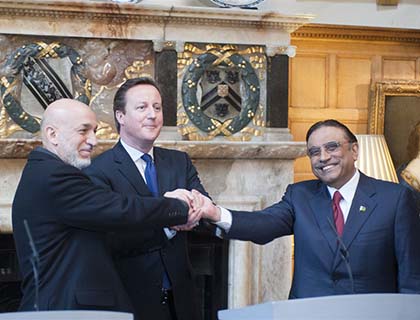The London trilateral summit last week introduced a new deadline in the withdrawal rush—“to take all necessary measures to achieve the goal of a peace settlement over the next six months”. Without a clue on how this ‘deadline’ is going to be met, the summit also came up with a range of ‘understandings’ between Afghanistan and Pakistan with support of the UK. They affirmed support for the Taliban office in Doha, an issue on which there are differences between Afghanistan and Qatar. They asked the Taliban to take steps necessary to open an office and to enter into dialogue.
Despite weeks of Kabul-Doha talks, no progress has been made. Foreign Ministry spread false reports in some international media outlets that an agreement has been signed. But the fact is that Qatar has not agreed to Karzai Administration’s demands of full control on the issue asking for an agreement that Doha close down the office within six months if Taliban do not start direct talks with the High Peace Council. The ‘six-month deadline’ seems a magical target when Taliban have repeatedly and categorically rejected direct talks with Kabul. Some of their leaders from the political commission of the Quetta Shura have even said the HPC in its current form cannot be taken serious as a negotiator. At the trilateral summit, apparently Pakistan has officially confirmed support for Kabul’s conditions on the Doha office. It is unclear how it can affect the Taliban attitude.
Another ‘development’ in the summit was Pakistan’s commitment to “strengthen co-ordination of Taliban detainee releases in support of the peace and reconciliation process.” So far about 20 Taliban leaders and commanders have been released, but Kabul has no clue on their whereabouts. Some officials express concerns they might end up on battlefield. Islamabad has now agreed for a mechanism of coordination with the Government on release of the prisoners.
But the question is, when Islamabad assures full cooperation on the reconciliation efforts to be, in their own words, “Afghan-owned and Afghan-led”, why it takes for a summit in London to come to agreement on something fundamental in the process? Pakistan’s DAWN newspaper reported that their Foreign Secretary Jalil Abbas Jilani has said Islamabad would send lists of Taliban prisoners whom they intend to release to the High Peace Council for comment on the list. HPC has welcomed the move saying it is a significant step towards more cooperation between the two countries. Each time there has been such reports of a ‘significant progress’, Government circles in Kabul have hyped it as a breakthrough, but soon complaints restart regarding lack of coordination, ambiguity and ineffectiveness or accusations of insincerity.
It is unlikely that Islamabad will ‘cooperate’ in the process without political compensations. The military establishment in Rawalpindi does not seem to have reckoned a shift in their decade-old strategy of harboring Taliban leadership. They have clearly reiterated that they cannot guarantee Taliban’s willingness for talks.
Peace and reconciliation efforts are not inclusive and lack a coherent strategy. HPC has to avoid the narrow domestic agendas of the current administration to give a final blow to this last chance of any serious progress on the hopes of a genuine reconciliation.
The London summit also gave yet another inexact schedule for the Ulema Conference in “early March”. Earlier it was enthusiastically brought up during the much-hyped visit of HPC Chairman Salahuddin Rabbani to Islamabad. The Ulema Conference has been postponed twice. Kabul had proposed names of several top Pakistani clerics from the religious political parties for the conference, which the Pakistan government and security establishment have opposed. The goal of the conference is to get a Fatwa by renowned scholars and clerics, most of who in Pakistan publicly support Taliban, against the suicide attacks and urge for peace talks. A Taliban statement from Mullah Omar published by major media outlets in Pakistan warned their Ulema not to attend the conference.
If Afghanistan and Pakistan cannot cooperate on mutual issues of security and in other areas in meetings in Islamabad or Kabul, a summit in UK or Turkey cannot bring real change in attitude. Core of the problem is in contradictory objectives, goals and strategies.
Meanwhile, there was not any significant discussion on the proposed AfPak Strategic Partnership Agreement committed in September last year. The two sides have agreed that negotiations would commence with meetings of Foreign, Interior and Commerce Ministers this month to take forward trade and border management issues.
Distrust and temporary moves will continue without a clear strategy unless root causes are addressed. For a long-term strategic solution to improve genuine cooperation on both sides, Kabul and Islamabad should focus on solution of the political dispute on Durand Line border. It is not only vital for the current conflict in Afghanistan, but necessary for long-term regional stability, peace and security.

